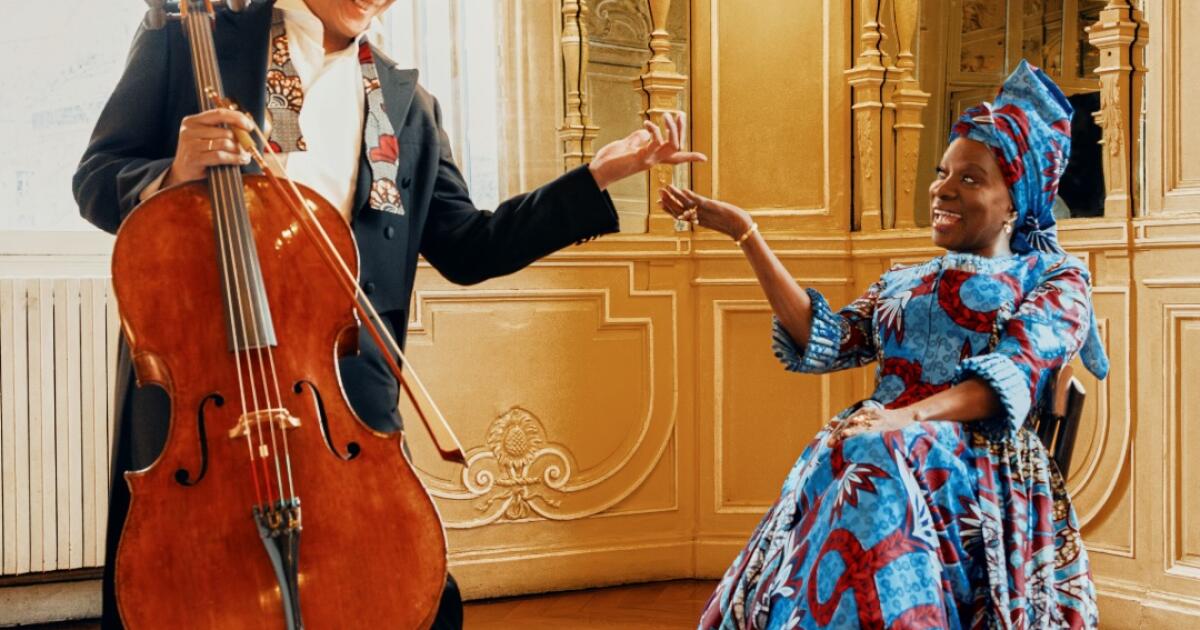[ad_1]
The center and soul of suites by Bach and Handel are sometimes discovered within the sluggish, central sarabande, stated to be a dance of Spanish origin. In Bach’s cello suites, the sarabande stops time. Watch Yo-Yo Ma play a sarabande. His eyes appear to recede underneath his eyelids, as if coming into a profound state of hypnosis. He could make a Bach sarabande work anyplace, together with on a river rafting journey with a background of gurgling water on his newest Bach recording.
The sarabande from Handel’s D-Minor Keyboard Suite is properly often known as the theme from “Barry Lyndon,” about to thrill Stanley Kubrick followers over again with the brand new fiftieth anniversary 4K restoration screening Saturday night time on the Egyptian.
That Handel sarabande was one of many catchy opening numbers of “Sarabande Africaine,” Ma’s joint look with Afropop singer-songwriter Angélique Kidjo on the Hollywood Bowl on Thursday night time. Ma and Kidjo met seven years in the past at an occasion in Paris commemorating the top of the World Battle I. That led him to look just a little deeper into music he had been enjoying since he was a younger boy and was by now ingrained in his DNA.
And it led him to loudly exclaim, earlier than enjoying the sarabande from Bach’s Second Solo Cello Suite in his brief solo set, “Who knew?”
Musicologists have found the origin of the rhythmic patterns of what grew to become this Baroque period car for the transmigration of souls in dances carried by enslaved Africans to sixteenth century Spain. The church banned the sarabande for its perceived lusty eroticism. However when the dance later reached the palms of a sure German father of 20 kids, Bach made sarabandes of such mystical serenity that eros equaled the sacred miracle of recent life.
That Ma, an outdated Silk Street musical warrior, and the multifaceted Kidjo bonded is hardly stunning. However that they may placed on a present with a superb household of African drummers, Caribbean piano and percussion, and diverse electrical guitars and brass and dancers wherein all of the world — not simply Bach however Philip Glass, Dvorak, Gershwin, Ravel, you identify it — gave the impression to be simply ready for the proper African accent, and that conventional African music wanted no translation in any respect for some 17,000 at a close to full Bowl, that was one thing.
Even so, Kidjo and Ma are an odd couple. Kidjo proudly transforms something she comes into musical contact with. To listen to “Summertime” in Swahili, a stupendous language for tune, is indescribably touching. Kidjo added phrases to “Bolero.” They weren’t translated and didn’t should be. Ravel’s rhythms had a riveting new freshness.
Ma’s cello, alternatively, matches in, usually remaining within the background, although not a distant background. He bought into playful duets with drummers and a transferring one with Kidjo as an intro to “Summertime.”
There was discuss of peace, a greater world the place we perceive one another, by each Ma and Kidjo. They demonstrated how which may work, with Kidjo commanding the stage, brilliantly dressed, whereas Ma, seated and in a sport coat for the primary half, talking a distinct but suitable musical language. Even so, it was the large, crowd-pleasing Kidjo numbers that finally despatched the viewers house dancing.
There was, nevertheless, one significantly fascinating space of communality. Glass has written vital items for each. Ma is featured in Glass’ 2002 rating to “Naqoyqatsi,” the third within the “Qatsi” trilogy of silent documentary movies by director Godfrey Reggio. Though the least recognized, “Naqoyqatsi” has an antiwar theme that will have match proper in with “Sarabande Africaine.”
Glass additionally fell underneath Kidjo’s spell, first composing three enchanted “Yoruba” songs for the singer, after which his Symphony No. 14 (“Lodger”) for her and premiered by the Los Angeles Philharmonic in 2019. The third in one other Glass trilogy, this of symphonies based mostly on David Bowie albums, “Lodger” consists of seven Bowie songs sung by Kidjo with new music by Glass.
For “Sarabande Africaine,” Kidjo sang the primary of the songs within the symphony, “Transfer On,” organized for cello, piano and percussion. Ma carried the primary orchestral melodic traces. Bowie, who generally felt the necessity to transfer on, may properly have written the tune for Kidjo, with traces like, “Someplace, somebody’s calling me.”
The 2-hour “Sarabande Africaine,” with out intermission, may get a tad preachy. The evangelical mixing of musical genres and geography had its touristy parts; nevertheless participating and engrossing the wonder-making, it was at all times fleeting.
However, sarcastically, “Transfer On,” in its new setting, had the powerfully intimate really feel of stopping and reflecting. This was the one composer Kidjo and Ma each knew personally. They had been equals and equally at house along with his fashion, and the motion put the transferring on, the “drifting like a leaf,” “feeling like a shadow,” stumbling “like a blind man,” in revealing reduction.
“Transfer On” ends with Ma tracing a haunting, fleeing cello response to Kidjo singing “Can’t neglect you / Can’t neglect you” She may need been talking for the way her viewers hears her, but in addition of the forgetful nature of the historical past of music, wherein we’re perhaps not meant to recollect. You hear one thing, make it your individual and transfer on.
[ad_2]

